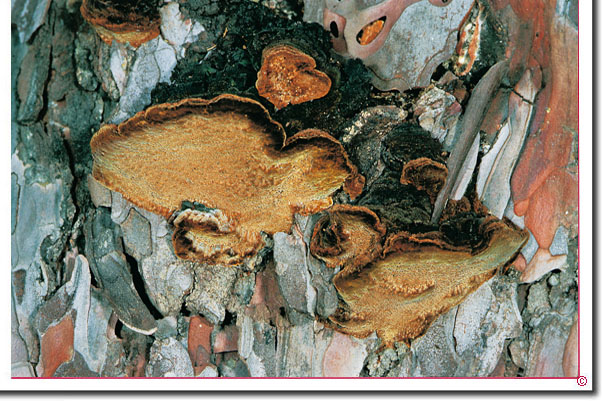
Der Kiefern-Feuerschwamm Phellinus pini muss derzeit
auf den Namen Porodaedalea pini hören.
Genauer: Porodaedalea pini (Brot.) Murrill, Bull. Torrey bot. Club 32 (7): 367 (1905)
Erstmals gültig beschrieben hat den Pilz anno 1804 der portugiesische Botaniker
Félix da Silva Avelar Brotero (1744-1828) als Boletus pini,
und zwar in der Flora Lusitanica Band 2 auf Seite 468
Hier ein paar der Stationen seiner Pilzreise durch die diversen Gattungen:
Daedalea pini (Brot.) Fries, Syst. mycol. (Lundae) 1: 336 (1821)
Polyporus pini (Brot.) Persoon, Mycol. eur. (Erlanga) 2: 83 (1825)
Trametes pini (Brot.) Fr., Epicr. syst. mycol. (Upsaliae): 489 (1838)
Fomes pini (Thore) P. Karsten Bidr. Känn. Finl. Nat. Folk 37: 79 (1882)
Ochroporus pini (Brot.) J. Schröt., in Cohn, Krypt.-Fl. Schlesien 3.1(25–32): 487 (1888)
Trametites pini (Brot.) Mesch., Syll. fung. (Abellini) 10: 747 (1892)
Xanthochrous pini (Brot.) Patouillard, Cat. Rais. Pl. Cellul. Tunisie (Paris): 52 (1897)
Phellinus pini (Brot.) Bondartsev & Singer, Atlas Champignons l'Europe 3 (1): 517 (1941)
Cryptoderma pini (Thore) Imazeki, Bull. Tokyo Sci. Mus. 6: 107 (1943)
Inonotus pini (Brot.) Teixeira, Revista Brasileira de Botânica 15 (2): 126 (1992)
Statistisch ist ein neuer Name für den alten Pilz schon fast überfällig...
Volksnamen:
Deutsch: Kiefern-Feuerschwamm .
Englisch: red heart of pine .
Niederländisch: Dennenvuurzwam .
Dänisch: Fyrre ildporesvamp .
Norwegisch: Furustokkjuke .
Schwedisch: Tallticka .
Finnisch: Männynkääpä .
Slowakisch: Ohnovec sosnový, .
Polnisch: Czyren sosnowy .
Litauisch: Pušinė kempinė .
Estnisch: Maennitaelik .
Speisewert
()
. Vorkommen .
an Kiefer
. Lebensweise .
erst parasitisch , dann
. saprobiontisch .
. Größe: m bis xl
. Unterseite
. porig .
Sporenpulverfarbe:
braun
Verwandtschaft:
Ständerpilze
. Basidiomycetes .
Porlinge
. Hymenochaetales .
Ritterlingsverwandte
. Hymenochaetaceae .
Feuerschwämme
. Phellinus .
Hier gehts zur Beschreibung von Porodaedalea pini.
